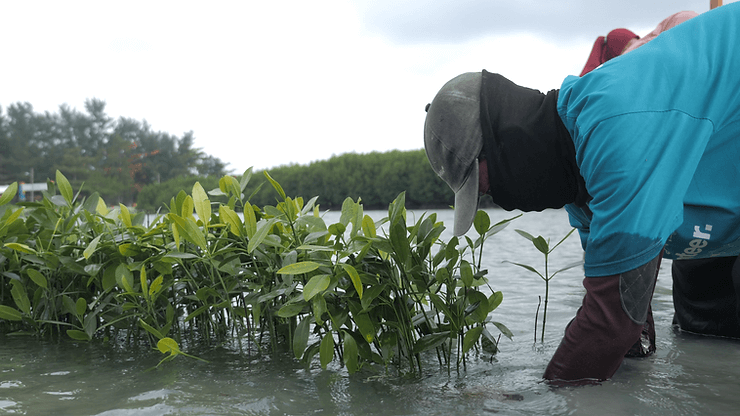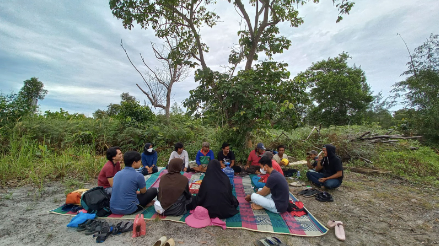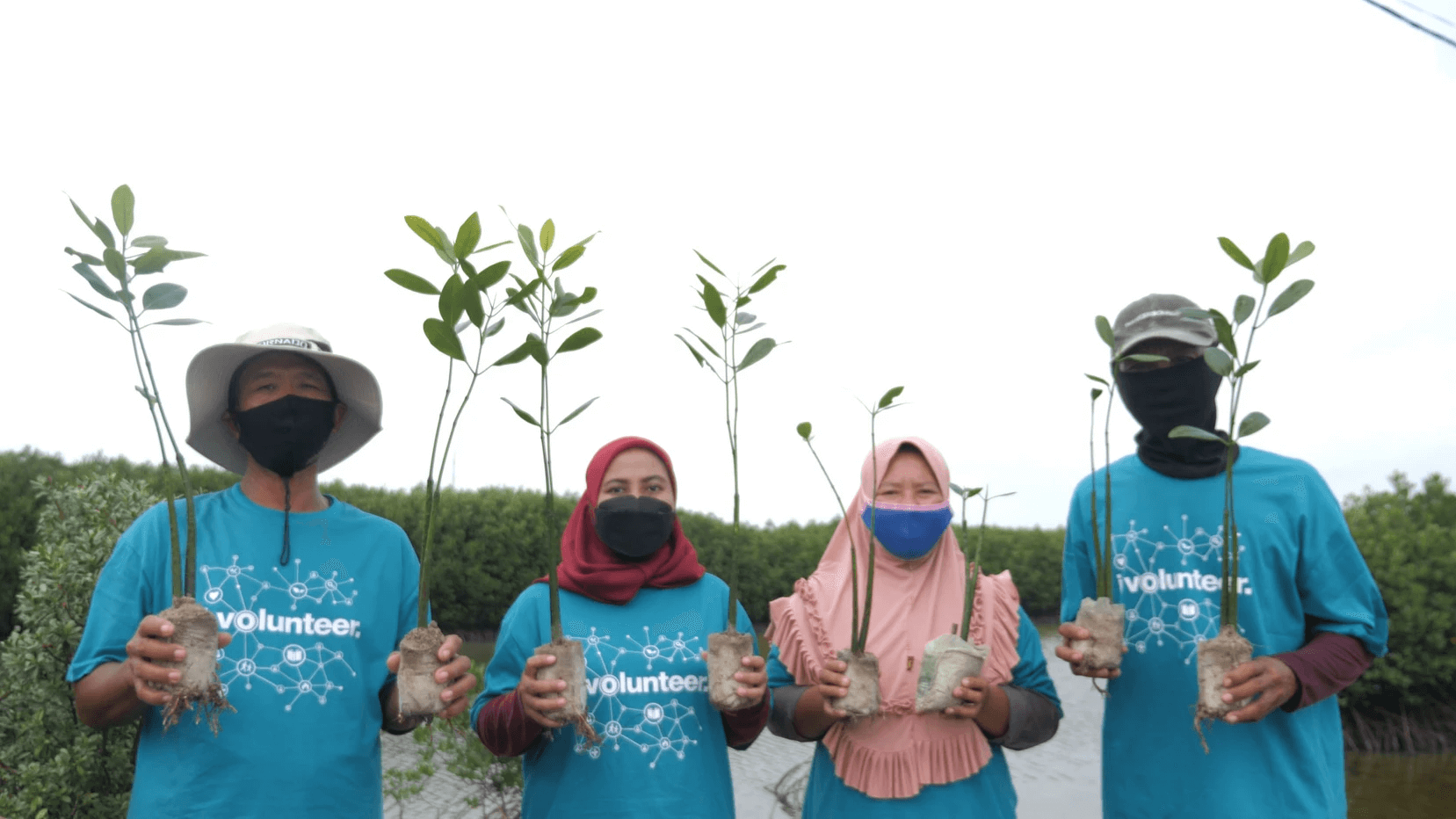CarbonEthics' Efforts to Help Coastal Communities While Restoring Climate Balance
Started as a not-for-profit organization, now expanding into a social enterprise
Global environmental damage continues to threaten the habitat of all living things. A small step was started by Agung Bimo Listyanu (CEO), Innandya Irawan (COO), and Jessica Novia (CMO), who met at the One Young World Summit 2018 in the Netherlands to start CarbonEthics. At that time, the three served as delegates from each company, trying to find a way out to reduce carbon emissions.
"From there we aware that the climate can't wait. So, we need to do something beyond our office and ignite the spirit of each corporation to take action. Finally started to build CarbonEthics in May 2019," said Agung Bimo Listyanto, or more familiarly called Bimo when contacted DailySocial.id.
Each co-founder these come from diverse backgrounds. Bimo has experience as a geothermal engineering plus have worked in the commercial world for Sales and marketing, and was responsible for holding fund ESG special. Meanwhile, Jessica has a wealth of experience in the creative world, digital marketing, and management consulting.
Lastly, Innandya explores the energy industry supported by other experiences in the field of commercial and investment appraisal, decarbonization strategies, and more. All the capabilities of the three support each other in designing the vision and mission of CarbonEthics. For the record, the third co-founder this will just be full time in CarbonEthics as of January 2023.
“From the start we labeled ourselves as corporate activist, Who has privileges drive corporations from within. But it is also necessary to encourage it from the outside, such as evaluating the policies of companies that are still considered insufficient for the environment. We created CarbonEthics because we wanted to reach more parties are involved.”

Empower communities while reducing carbon emissions
In an effort to reduce carbon emissions, CarbonEthics' journey began by meeting with farmers on the coast to start focusing on restoring blue ecosystems. One of them, by planting mangroves, seagrass, and seaweed. This community group is most vulnerable to environmental issues, because if sea levels rise, their homes will be the first to sink.
Moreover, during the pandemic the welfare of these farmers was greatly affected. Their income has even fallen by as much as 90% due to reduced demand from closed restaurants, CarbonEthics finds.
“Mangroves, seagrasses and seaweeds can absorb between 4-10x more carbon than forests on land. But that's not what we're trying to solve. But in terms of ESG issues, how can the public get economic value of what is planted."
The CarbonEthics team, assisted by 100 volunteers, slowly approached the coastal farmers to start planting mangroves, with mentoring programs from the start to regular monitoring. This thorough process takes one to two years. These planted mangroves, seagrasses or seaweeds are orders purchased by CarbonEthics consumers, whether from retail or corporate consumers.
These farmers are in charge of taking care of it, assisted by the CarbonEthics team in mentoring. To maintain the trust of all parties, the team also intervened from an economic perspective to prevent farmers from cutting down or selling the mangroves that had been planted. Since the beginning of the mentoring, the team began to form farmer groups before being educated. Then build a bed, choose website, all passed through official permission from the local government.
"It's been a year, we'll see if we can educate them to next step, usually after planting mangroves, his wife [the farmer] what are you doing? We teach them to make soap from used mangrove seeds so they can have an income. Then you can also make batik from wilted mangrove seeds, this can be a natural batik dye.”

He does not agree with the program that on off, all must be sustainable until the people on the coast are educated. That they can live, obtain economic value by relying on mangroves.
So far, according to Bimo, CarbonEthics has had three planting areas spread across Harapan Island, Kep. Thousands, Dompak Island, Kep. Riau, and Padangbai, Bali. Specifically for Bali, CarbonEthics is planting coral reefs. Although this coral reef is not a blue carbon ecosystem, it is hoped that this planting can restore biodiversity in the sea that has already been damaged by human activities.
In creating the impact of reducing carbon emissions more broadly, CarbonEthics attracts more corporations to participate. Bimo said that his party provides a carbon footprint calculator on its website so that consumers can see how much carbon emissions are wasted in everyday life.
Consumers can calculate the carbon footprint of land and air vehicles, electricity, food and plastics. For example, access from home to work can be calculated and extrapolated for one year. Likewise, from the food consumed per serving for one week, plastic consumption, and electricity bills. Once all data is entered, the team will send a consumer-viewable dashboard along with recommendations for blue carbon ecosystems that need to be planted to restore wasted emissions.
"For corporate consumers, there are paid services for calculating the emission footprint according to with ESG protocol. Then from there there is a recommendation of how much carbon should be reduced, and the remainder of this wasted emission is compensated by restoration of the blue carbon ecosystem.”
So far, the blue carbon ecosystem package that CarbonEthics sells on its website has been purchased by 2 people and more than 80 companies have participated. Garnier - L'Oréal Indonesia, PT Allianz Indonesia, The Body Shop, Nike, and others are some of the big corporate names that have joined.
Indicators of the resulting impact

In measuring impact on the environment, CarbonEthics relies on Social Return on Investment (SROI). Every Rp1 invested in the company will generate a value of Rp4. As a result, the comparison is 1:4, the results measure from three aspects, namely social, economic, and environmental.
From the social aspect, the team measured how many farmers were involved and educated, also committed to implementing climate action. Don't forget to measure the family members of farmers who are affected by the program. Then, from an economic point of view, measuring how far the increase in income from and before farmers join the program. Finally, from the environmental aspect, calculate how much carbon is absorbed, be it from mangroves, seagrass, or seaweed.
From the company's current report, from an environmental perspective, CarbonEthics has absorbed more than 5,3 million kg of CO2e gas isolated, 68.357 mangrove trees were planted, 3.025 seagrass seedlings were planted, 4.050 seaweed seedlings were planted, and 4.270 baby corals were planted. Next from the social aspect, as many as 184.933 users, 2.709 climate actions were promised, 16 people with increased income, and 91 direct and indirect beneficiaries of coastal community members. From the economic aspect, as much as 22% increase in the average income of farmers.
In all business processes at CarbonEthics, the majority still use the traditional approach. However, now the team has completed the technological aspect in the form of a platform used by farmers to enter information from mangroves, both in the form of photos and tree sizes every six months. This information will be used by consumers who buy mangroves from CarbonEthics.
The reason is, the company enforces a guarantee, will replant if it is valid for two years. “We will transparently notify mangrove growth through the site. There is a two-year protection guarantee before the mangrove stabilizes, if before that period the mangrove dies, we will replace it immediately. However value What we always emphasize is the certainty that they live through an iterative process that we continue to do Improve. "
Bimo also believes in startup prospects impact like CarbonEthics have very wide growth space. Currently, the market share of the sustainability business is still niche, but from time to time its growth is so rapid. Because still niche, challenges arise in terms of higher selling prices, making adoption difficult to reach a more general market.
"Now demand Yes, but the price is still expensive. But over time, people are more educated, hopefully economies of scale can be created so as to create the same selling price.”
Therefore, to welcome the growth that will be even more rapid, co-founder CarbonEthics is ready to be full time in this business. It is targeted that in the future, the company can expand the blue carbon area at several points in Indonesia.

Currently CarbonEthics is also conducting fundraising, targeted until December 2022.
-
Disclosure: This article was published in collaboration with DailySocial.id and WIND for the Startup Impact Indonesia series. ANGIN also helps in curating related startups.
Sign up for our
newsletter
